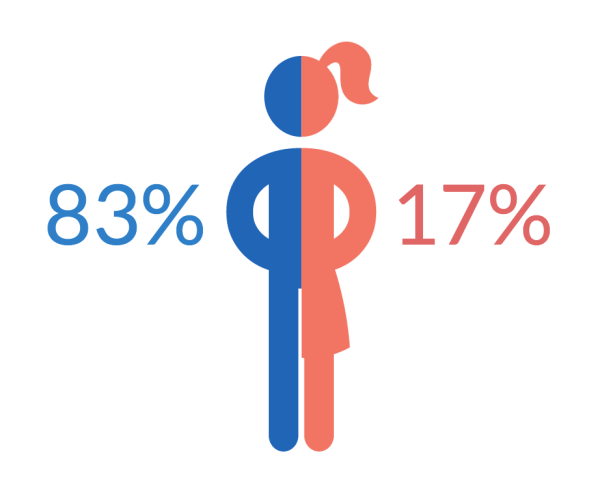
There is a worryingly low number of women on the sports desks of the UK’s national newspapers, and even though news organisations say they are free of gender bias, the situation isn’t improving fast enough.
The argument that women aren’t on sports desks simply because of their sex is outdated. And yet, news organisations are not actively encouraging women to put themselves forward for sports reporting roles – and they also have too few to choose from. The debate is no longer about sexism in the workplace, but about why there’s a lack of women to recruit.
This dearth of women sports reporters was highlighted by research carried out by Prof Suzanne Franks, head of the journalism department at City, and Deirdre O’Neill, a journalism lecturer at the University of Huddersfield. They looked at bylines across UK newspapers in 2012 and 2013, and found that at no point were the proportion of female bylines for sports reporting higher than 3 per cent. In August 2016, they published a paper reporting on how the situation has changed: the conclusion was that the workplace culture has improved, but the numbers have not.
This comes as no surprise to Janine Self, a freelance sports journalist who has previously worked for The Sun and is vice chair of the Sports Journalists’ Association. According to Self, the lack of female sports reporters “is worse than it’s ever been”.

She says: “Regarding sports reporting, print is 95 per cent men. There was a period probably around 10 or 12 years ago when there were more women reporters, but it was a bit of a fad. If you want to do sports reporting, it’s antisocial and hard unless you’re completely committed. I’ve seen feature writers try to move across to sports, but they didn’t last.
“The question isn’t if there’s a bias against women like there used to be – that’s not the case now. You have to flip it and say ‘why are women not being attracted to sports journalism?’ – participation is up in watching and playing sport, so why aren’t women reporting on it?”
Both women and men working in sports journalism are adamant that sexism within the workplace doesn’t exist – it’s about ability.
Ben Hunt, a Formula One and football journalist for The Sun, says: “Sexism doesn’t really exist within sports journalism. It’s your ability more than anything else. Being a woman doesn’t make you less or more likely to succeed.”
Martha Kelner, athletics correspondent and sportswriter for the Daily Mail, agrees. She said: “I don’t think it exists anymore that editors are actively seeking not to employ women – that’s outdated. From my personal experience, editors are keen to promote me in what I’ve been doing. But only if you’re good – I’m not getting special treatment because I am a woman.”
So if it’s not a matter of discrimination, and gender isn’t a factor, what is it? Kelner feels that while there’s no lack of young women interested in sports journalism, there is a disconnect between them leaving education and starting a career on a sports desk.
“I get a lot of girls emailing me, either at school or university, asking for advice on getting into sports journalism,” says Kelner. “But I don’t know what happens between that and then applying for jobs, because there still aren’t very many women in staff jobs. At the Daily Mail, there’s only myself and Laura Williamson, the sports news editor. On other papers it’s even worse, which is odd because there isn’t any reluctance on the part of editors to not employ women.”
(Feature continues below)
Progress is slow, but while there may be few women at the edge of the tracks and pitches, more women are taking on top positions in sports reporting. In 2013, the Mail on Sunday appointed the first female sports editor of a national newspaper, Alison Kervin. Earlier this year, Elizabeth Ammon was appointed a cricket news reporter at The Times. In broadcasting, Clare Balding, Gabby Logan and Helen Skelton fronted the 2016 Rio Olympics coverage.
Nonetheless, despite these strong role models, there isn’t a generation of female sports reporters coming through the ranks. Self believes that there is an element of fear contributing to the problem – a fear of knowing you’re in the minority as a woman in sports reporting. She says: “In a world dominated by male reporters, it’s a permanent stag party and it can be really laddish at times, even though that is changing.”
Shelley Alexander, editorial lead on women’s sport for the BBC, spoke this year at a diversity forum about the difference in attitudes between men and women and how it contributes to their success. She claimed that if there was a job advertised and a young man and woman of equal experience were told six things that the job required, the woman would be more reluctant to apply if she didn’t fulfil all six criteria. As Self put it: “Men will bullshit and women will be very honest.”
Kelner is of the opinion that few women have professional sports careers and so have less exposure or motivation to go into sports journalism. The problem appears to stem from an earlier stage, when teenagers and young adults are considering which career to pursue. Years before students reach the newsroom, sports reporting is rarely discussed as an option for aspiring journalists, especially women.

Carys Edwards, an undergraduate journalism student in her final year at City, is researching the number of women in the UK print industry.
She says: “The reason for the lack of women stems from lower down – women either don’t want to, or aren’t encouraged to write for their local sports papers,and this is often the way into nationals.”
Self points out: “Young women are being put off by the prospect before they even know what it entails. I would be interested in how many career advisers at school suggest it as an option.”
Workplace culture has changed. Now, schools and universities need to catch up – their role is to encourage women to view sports reporting as a natural, normal direction in which to take their careers.


















